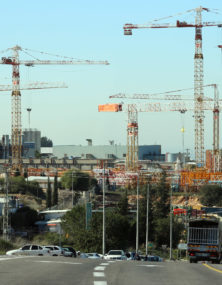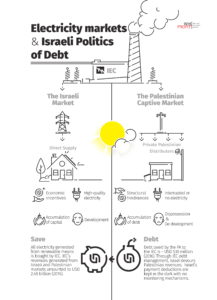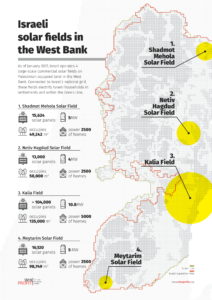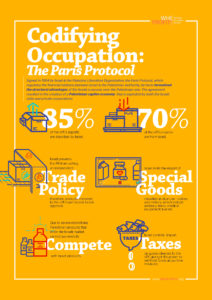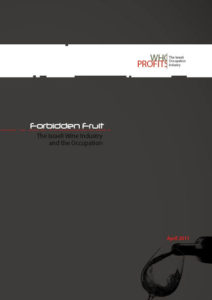Economic Exploitation
From the onset of its 1967 military occupation of the Palestinian territory and the Syrian Golan, Israel has used its military rule to the advantage of Israeli and international corporations and economic interests, and the detriment of the occupied Palestinian economy.
All Palestinian imports and exports are controlled, restricting competition with Israeli producers, and reducing the Palestinian consumer market to a captive market for Israeli goods. Regulatory and effective restrictions have been imposed on the development of businesses that could compete with Israeli industries, and all basic and utility services were routed through Israeli firms. Severe restrictions on the movement of Palestinian labor and goods inside occupied Palestinian territory and to neighboring areas have further increased the dependency of the Palestinian economy on Israeli companies as employers and retailers. The growing apparatus of checkpoints and walls has all but destroyed Palestinian local production and Palestinian labor bargaining power.
Israeli companies have a relatively high concentration of capital and unobstructed freedom of movement. When operating in occupied Palestinian territory, they also enjoy special governmental support, access to cheap resources, tax incentives, and very lax enforcement of labor laws and environmental protection laws. These advantages result in the exploitation of Palestinian labor, Palestinian natural resources, and the Palestinian consumer market.
Arguably the most significant document for understanding the economy of the Israeli occupation is the Paris Protocol, the economic annex of the Oslo Accords, which codified and cemented Israeli domination over the Palestinian economy. The agreement regulated financial relations between Israel and the Palestinian Authority, placing them under the customs envelope. As a result, both markets are subject to the Israeli currency and the same import and export system. Though signed in 1994 as an interim agreement for a period of five years, the Paris Protocol continues to provide the basic framework for the economic relations between the occupying and the occupied economy. Its significance, which cannot be overstated, is that practically all Israeli companies involved with the Palestinian economy gain direct or indirect advantages from Israeli authorities and the special conditions created by the occupation. Therefore, the companies profiled by Who Profits serve only as examples of the different types of structural advantages enjoyed by Israeli and multinational companies in the framework of the Israeli occupation.
Who Profits has identified three sub-categories of corporate activity centering on Economic Exploitation: Exploitation of Occupied Production and Resources, refers to corporate involvement in the plunder and exploitation of occupied natural resources and production. Exploitation of Labor, refers to the exploitation of an occupied labor force by Israeli and multinational corporations, and the Palestinian Captive Market, which refers to Israeli and international companies benefiting from the structural advantages of the Palestinian captive market in the framework of the Israeli occupation.






